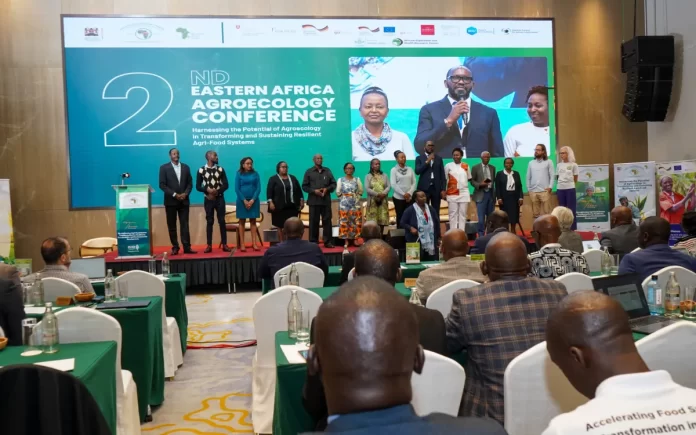By Jackson Okata
Nairobi, Kenya: Climate-smart farming crusaders and stakeholders are challenging African governments to initiate and enact policies that will see the region cut over-reliance on conventional food production systems as a solution to the continent’s food crisis.
Farmers, policymakers, researchers, civil society, and private sector leaders meeting in Nairobi from March 25-28, for the second Eastern Africa Agroecology Conference argue that Africa already has solutions to its food and nutrition crisis.
Biovision Africa Trust Executive Director Dr. David Amudavi observed that a policy shift that focuses more on the farmer will be key to unlocking Africa’s food potential.
“The solutions to Africa’s food crisis are already in African fields — we just need to listen to the farmers,” said Amudavi.
 According to Amudavi, the degradation of Africa’s ecosystems and biodiversity loss is not just an environmental concern, but also a direct threat to food production and human well-being.
According to Amudavi, the degradation of Africa’s ecosystems and biodiversity loss is not just an environmental concern, but also a direct threat to food production and human well-being.
“Farmers can no longer predict the rains as they once did. Climate change is no longer a future threat—it is our daily reality,’’ he said.
For Africa to successfully shift to agroecology, Amudavi noted the need for policy, science, and people to connect in harmony and not hierarchy.
Germany Development Agency (GIZ) Country Director Bodo Immink, pushed for the need to put farmers as central figures in the transition from conventional farming methods to agroecological ways.
“Farmers are not mere recipients of messages—they are the crucial change agents,” Immink said.
“Kenya’s National Agroecology Strategy, developed through a participatory process, offers a long-term framework for food system transformation,” said Immink.
Immink insisted that the shift to agroecology for Africa was unavoidable, warning that the continent’s current agricultural systems prioritize short-term gains over the resilience and prosperity of future generations.
“With over 70% of the population still engaged in farming, agriculture remains the lifeline for food security, economic prosperity—and political stability.” Immink noted.
He said that the empowerment of farmers, communities, civil society, and the private sector can only lead to transformative change if governments provide the enabling framework and public investment
Dr. Hans Herren, President, Foundation for Ecological Development warned that the dominant industrial food system is broken and driving hunger, obesity, biodiversity loss, and climate change.
This year’s conference is running under the theme of “Strengthening agri-food system transformation for resilience, sustainability and socioeconomic development”.
The conference brings together participants from over 30 countries.
According to the Food and Agriculture Organization of the United Nations (FAO), comprehensive action is needed to address Africa’s alarming statistics on food insecurity and malnutrition that underscore the urgent need for comprehensive action.
Africa has an estimated 282 million people battling undernourishment, with more than a billion people unable to afford a healthy diet. Around 30 per cent of children are stunted because of malnutrition.
FAO warns that Africa remains off-track to meet the food security and nutrition targets of the Sustainable Development Goals by 2030, and the Malabo targets of ending hunger and all forms of malnutrition by 2025.














